Did you know that businesses using a CRM system experience a 29% increase in sales? In today’s fast-paced business environment, effective customer relationship management (CRM) is not just an option; it’s a necessity. For bookkeepers, who often juggle numerous client accounts and financial records, a robust CRM solution can significantly streamline operations, enhance customer satisfaction, and ultimately drive growth.
The purpose of this article is to explore the best CRM systems specifically tailored for bookkeepers. By evaluating different CRM solutions, their features, pricing structures, and ideal use cases, we aim to help you find the perfect tool to optimize your customer relationships and business processes.
Choosing the right CRM is pivotal for your business success. It not only aids in customer retention but also enhances operational efficiency by automating repetitive tasks and centralizing customer information. In this article, we will cover essential factors to consider when selecting a CRM, list the best CRM options for bookkeepers, and provide a beginner’s buying guide to ensure you make an informed decision.
What to Look for in a CRM for Your Business
Scalability
When choosing a CRM, one of the most critical factors to consider is scalability. As your bookkeeping practice grows, your CRM should be able to accommodate increasing data and user demands without compromising performance. Opt for a solution that can easily adapt to your evolving business needs, whether you plan to expand your client base or introduce new services.
Ease of Use
An intuitive interface is essential for any CRM, especially for small teams or those new to CRM systems. The ease of use can greatly impact your team’s adoption of the software. Look for a CRM that offers a straightforward onboarding process, allowing you and your team to get up to speed quickly without extensive training.
Customization
Every bookkeeping business has its own unique workflows and requirements. This is where customization comes into play. A CRM that allows for tailored features—such as custom fields, templates, and workflows—can significantly enhance your efficiency. Ensure that the CRM you choose enables you to adapt the system to your specific needs rather than forcing you to conform to its limitations.
5 Best CRM Solutions for Bookkeepers
Here is a curated list of the best CRM solutions for bookkeepers, designed to enhance your practice’s efficiency and effectiveness:
1. Pipedrive CRM
Pipedrive is a sales-focused CRM designed to help businesses manage and streamline their sales processes. Its intuitive interface makes it easy for teams to visualize pipelines, track deals, and close more business. Pipedrive is known for its simplicity and user-friendliness, making it ideal for small to medium-sized businesses that want to improve sales efficiency without complex setups.
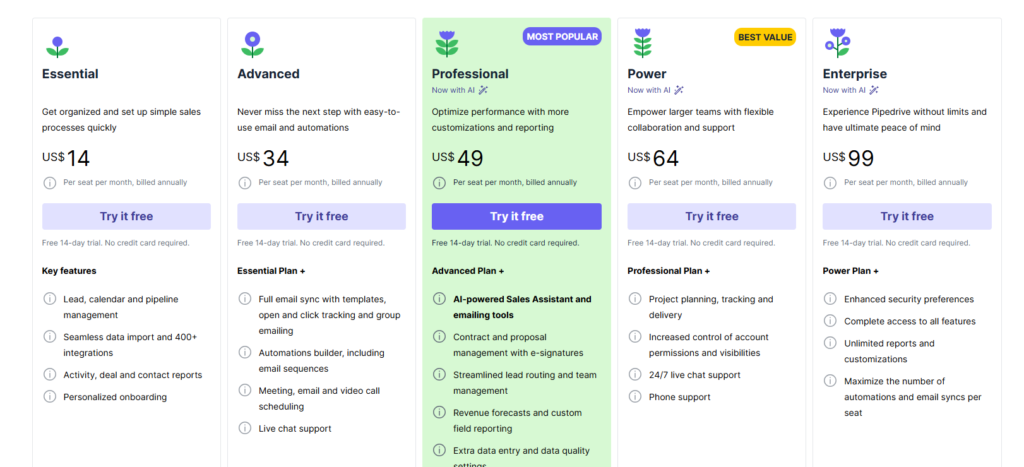
Key Features:
- Pipeline Management: Bookkeepers can organize their client acquisition process with visual sales pipelines, making it easy to track the status of leads and follow up with potential clients.
- Customizable Dashboards: Offers custom fields and data points, allowing bookkeepers to tailor client management processes based on specific business needs.
- Automation & Task Management: Bookkeepers can automate repetitive tasks, such as client reminders and follow-up emails, saving time and ensuring no client communication is missed.
- Email Integration: Syncs with email platforms to manage communication directly within the CRM, keeping all client interactions in one place for easy access.
- Reporting & Analytics: Provides detailed reporting on sales activities, helping bookkeepers identify trends, track performance, and make data-driven decisions.
Pricing:
- Essential Plan: $14/month per user (basic pipeline and sales management).
- Advanced Plan: $34/month per user (email automation, custom workflows).
- Professional Plan: $49/month per user (advanced reporting, deeper integrations).
- Power Plan: $64/month per user (team management tools, advanced permissions).
- Enterprise Plan: $99/month per user (unlimited access to all features and premium support).
Freelance or small bookkeeping firms that need a simple, visual way to manage their client pipelines and automate basic tasks. Ideal for bookkeepers looking to improve client acquisition and management without complex CRM systems.
2. HubSpot CRM
HubSpot CRM is a comprehensive, user-friendly platform designed to manage all aspects of customer relationships, sales, and marketing. It’s widely known for offering a free tier with robust features, making it attractive to small and growing businesses. HubSpot’s ecosystem can scale as your business grows, thanks to its advanced tools for automation, reporting, and customer management.
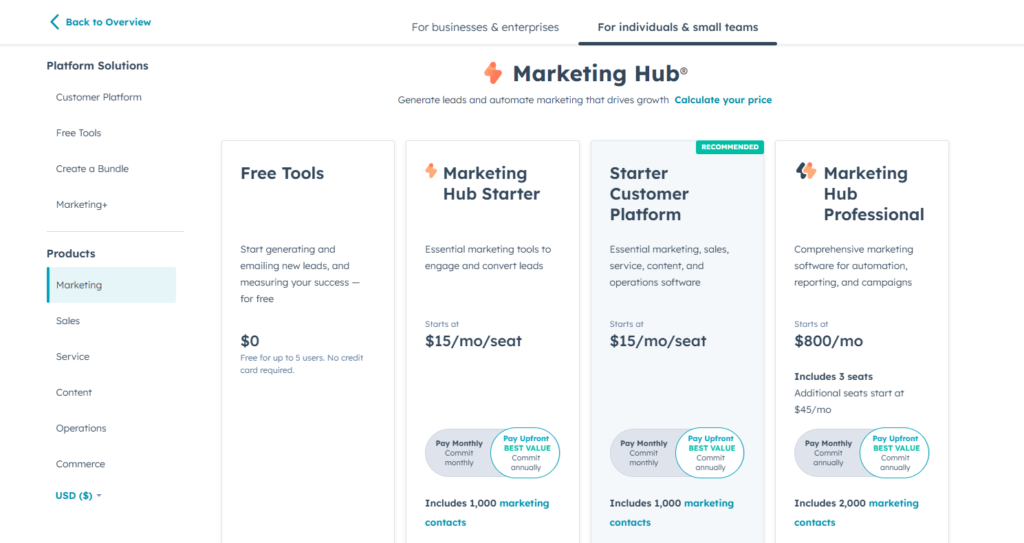
Key Features:
- Contact & Lead Management: Allows bookkeepers to track client interactions, keep detailed notes, and organize contact information in one place, making client management more efficient.
- Email Integration: Seamlessly integrates with Gmail, Outlook, and other platforms to track email communications, ensuring bookkeepers never lose sight of important client exchanges.
- Sales Pipeline Management: Bookkeepers can easily track leads and convert them into clients, with customizable deal stages to streamline workflows.
- Reporting & Analytics: Provides in-depth insights into sales activities and client relationships, enabling bookkeepers to optimize performance and client retention strategies.
- Task Automation: Automates routine tasks like follow-up emails, saving time and allowing bookkeepers to focus on higher-value work.
Pricing:
- Free Plan: $0 for core features (contact management, task management, email tracking).
- Starter: $15/month (advanced tools, more storage, and automation).
- Professional: $800/month (advanced CRM automation, sales forecasting, deeper integrations).
- Enterprise: $3,600/month (high-level enterprise features, advanced reporting, and scaling tools).
Freelance bookkeepers and small bookkeeping firms that need a free or low-cost solution to manage clients, track communications, and streamline their sales pipeline would benefit the most from HubSpot. Larger firms can leverage its advanced tools at higher price points.
3. Salesforce CRM
Salesforce CRM is a robust, cloud-based platform that offers a suite of tools for managing client relationships, sales, and workflows. It is highly customizable and scalable, making it ideal for businesses of all sizes. With advanced automation, analytics, and integrations, Salesforce helps bookkeepers efficiently manage client data and streamline operations.
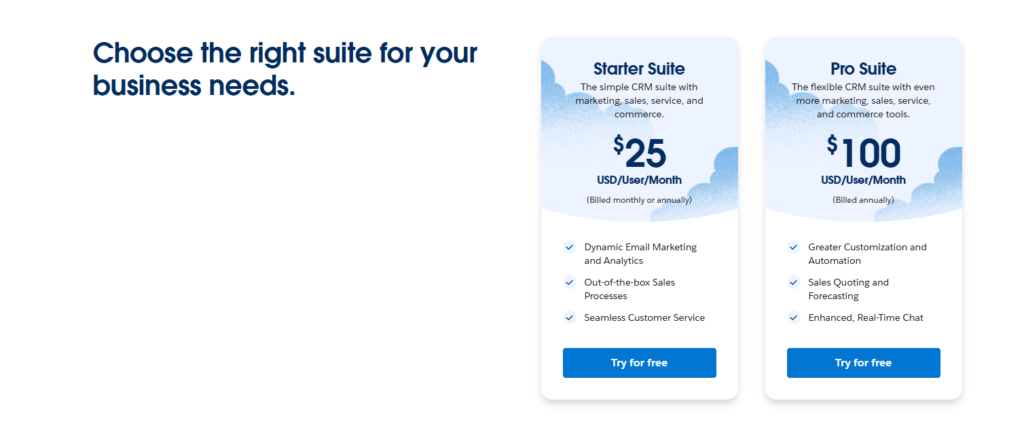
Key Features:
- Client Management: Allows bookkeepers to store and organize client information, track interactions, and manage relationships, ensuring nothing falls through the cracks.
- Customizable Dashboards & Reports: Bookkeepers can create tailored reports to monitor KPIs, track client transactions, and analyze financial data in real-time.
- Task & Workflow Automation: Automates repetitive tasks like invoicing, reminders, and follow-ups, freeing up time for bookkeepers to focus on more value-driven activities.
- Integrations: Seamlessly integrates with accounting tools like QuickBooks and Xero, enabling bookkeepers to sync financial data across platforms.
- Mobile Access: Salesforce’s mobile app allows bookkeepers to manage clients, review financials, and update tasks from anywhere.
Pricing:
- Essentials: $25/user/month (basic CRM for small teams).
- Professional: $75/user/month (full CRM for growing teams).
- Enterprise: $150/user/month (customization and automation for scaling).
- Unlimited: $300/user/month (premium support and unlimited features).
Large or growing bookkeeping firms that need a powerful, customizable CRM with advanced automation, reporting, and integration features. Ideal for bookkeepers managing multiple clients, complex workflows, and financial data at scale.
4. Keap CRM
Keap (formerly Infusionsoft) is an all-in-one CRM designed for small businesses, combining customer relationship management with marketing automation and e-commerce functionalities. It aims to simplify client management by automating repetitive tasks, which helps business owners, including bookkeepers, save time and stay organized.
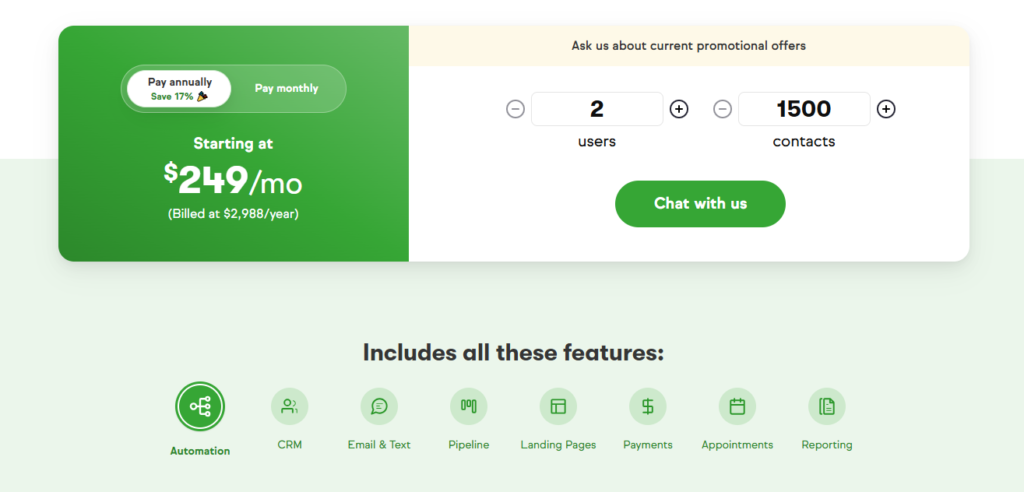
Key Features:
- Client & Contact Management: Bookkeepers can store client information, track communications, and manage all interactions from one place, ensuring a clear overview of each client’s needs.
- Automated Follow-ups & Reminders: Automates tasks like sending follow-up emails, reminders for appointments, and payment requests, helping bookkeepers reduce manual effort.
- Appointment Scheduling: Allows clients to book meetings directly through the system, saving time on scheduling and reducing no-shows.
- Email Marketing & Campaign Automation: Bookkeepers can create automated email sequences to stay in touch with clients, helping maintain relationships and promoting additional services.
- Invoicing & Payments: Integrated invoicing and payment tracking make it easier for bookkeepers to send invoices and track when payments are due or completed.
Pricing:
$249/month for 1,500 contacts and 2 users (pricing increases based on the number of contacts and users).
Small to medium-sized bookkeepers who want to automate client communication, follow-ups, and payments while maintaining a strong relationship with their clients. It’s especially useful for bookkeepers looking to simplify administrative tasks and scale their client base with minimal manual input.
5. Freshsales
Freshsales is a cloud-based CRM that offers a simple and intuitive platform for managing client relationships, sales, and workflows. Part of the Freshworks suite, it is designed to help businesses of all sizes streamline their client interactions and automate sales processes, making it a great choice for bookkeepers seeking an efficient client management tool.
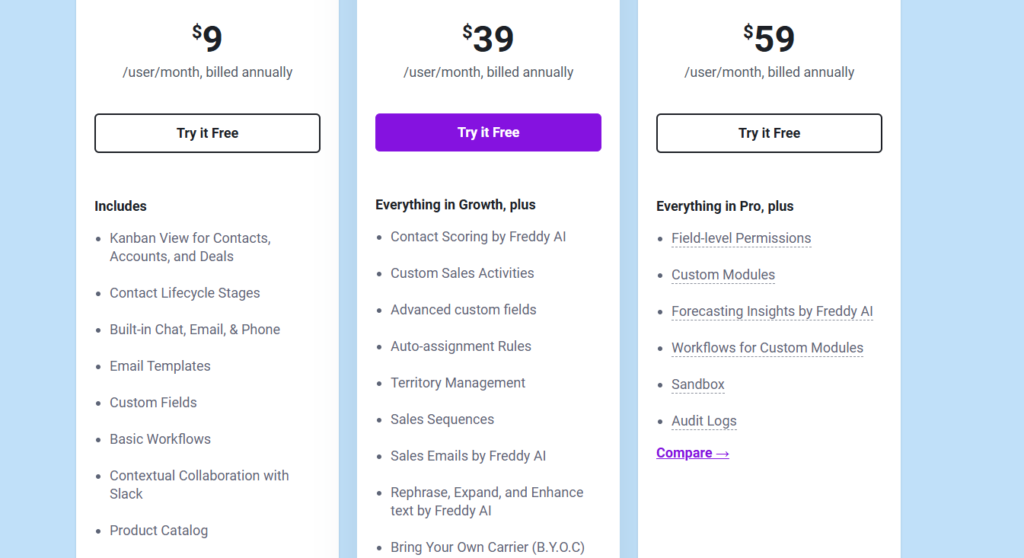
Key Features:
- Contact & Lead Management: Bookkeepers can store client details, track interactions, and monitor the progress of leads, ensuring they have a clear view of all client relationships.
- AI-Powered Insights: Provides AI-driven recommendations and insights, such as identifying high-value clients or forecasting sales trends, helping bookkeepers prioritize efforts.
- Email Tracking & Templates: Track when clients open emails, send automated responses, and use templates to quickly send reminders for appointments or payment requests.
- Workflow Automation: Automates tasks like follow-up emails and reminders, allowing bookkeepers to focus on critical tasks while ensuring clients receive timely communications.
- Customizable Dashboards & Reports: Bookkeepers can create custom reports and dashboards to monitor client data, track transactions, and analyze performance.
Pricing:
- Free Plan: $0 (basic CRM features for small teams).
- Growth: $15/user/month (includes automation and integrations).
- Pro: $39/user/month (advanced workflows and detailed reports).
- Enterprise: $69/user/month (customizations and premium support).
Freelance or small bookkeeping firms looking for an affordable, easy-to-use CRM with automation features and client management tools. Ideal for bookkeepers who want to streamline communication, automate repetitive tasks, and gain insights into client behavior without complex systems.
Which CRM is Best for Your Bookkeeping Practice?
After evaluating various CRM systems based on the factors mentioned above, I highly recommend Zoho CRM as the best option for bookkeepers. Its scalability, ease of use, and extensive customization features make it ideal for a growing bookkeeping business. Furthermore, it offers a robust integration with accounting tools, allowing seamless data flow and improved operational efficiency.
Use Case Recommendations
- For Small Bookkeeping Firms: HubSpot CRM is a fantastic choice for small teams looking for a user-friendly solution with powerful marketing capabilities.
- For Mid-Sized Firms: Keap offers robust features and customization options, making it suitable for firms looking to scale operations.
- For Firms with Heavy Client Interaction: Pipedrive excels in managing customer interactions and automating follow-ups, ensuring that no client communication falls through the cracks.
Next Steps
Ready to optimize your customer relationship management? I encourage you to take actionable steps such as starting a free trial or scheduling a demo with the recommended CRM providers. Most of these systems offer robust trial periods, allowing you to explore their functionalities without commitment.
How to Choose a CRM: A Beginner’s Buying Guide for Bookkeepers
Choosing the right CRM can seem daunting, especially for beginners. Here’s a detailed, step-by-step guide to help you select the best CRM for your bookkeeping business:
- Identify Your Business Needs
- Determine what features are most important for your practice. Consider aspects like client management, invoicing, reporting, and integration capabilities.
- Evaluate Features
- Compare the features of each CRM. Look for tools that help with contact management, task automation, and collaboration features.
- Consider Budget Constraints
- Determine your budget and explore CRM options that fit within it. Keep in mind that some systems may have hidden costs, such as fees for additional users or features.
- Assess Customer Support
- A strong customer support system is crucial. Look for CRMs that offer multiple support channels, such as chat, email, and phone support.
- Seek User Reviews and Testimonials
- Read user reviews and case studies to gain insight into how other bookkeeping firms have benefited from a particular CRM solution.
- Test the Software
- Utilize free trials to test the software firsthand. Pay attention to its usability and how well it integrates into your existing workflows.
Conclusion
In summary, selecting the right CRM is a critical decision that can significantly impact your bookkeeping practice. From improving customer retention to streamlining operations, the right CRM can be a game-changer.
When considering the best CRM for bookkeepers, remember to evaluate scalability, ease of use, and customization options. Zoho CRM stands out as the top recommendation based on its robust features tailored for bookkeeping needs.
As you embark on your journey to enhance your customer relationship management, keep in mind your long-term business goals and scalability when choosing a CRM.
FAQs
1. Do I really need a CRM?
Absolutely! A CRM helps you manage client relationships effectively, automating processes that save time and improve service quality.
2. How secure is my data in a CRM?
Most reputable CRMs implement stringent security measures to protect your data. Always check for compliance with data protection regulations.
3. Can a CRM integrate with my existing tools?
Many CRMs offer integrations with popular accounting and productivity tools, streamlining your workflow.
4. What is the cost of implementing a CRM system?
Costs vary depending on the CRM provider and features you choose. Some CRMs offer free versions, while others charge based on user counts and functionalities.
5. How long does it take to set up a CRM?
The setup time can vary. However, most user-friendly CRMs can be set up within a few days, especially if you take advantage of available tutorials and support.
By leveraging the information in this comprehensive guide, you’ll be well-equipped to choose the best CRM for your bookkeeping business, ensuring not only a streamlined operation but also enhanced client relationships and satisfaction.
I’m Palash Pramanik, an SEO and CRM expert with a deep passion for helping businesses thrive online. I specialize in driving higher search engine rankings and creating seamless customer relationship management strategies to enhance both visibility and engagement. Whether you need to boost your online presence, attract the right audience, or streamline your client interactions, I offer tailored solutions designed to meet your specific needs. My goal is to help you optimize your digital strategy, strengthen customer connections, and drive sustainable growth. Let’s work together to elevate your business to new heights!


